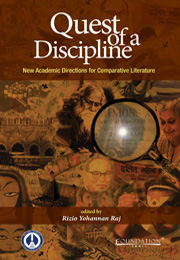Book contents
- Frontmatter
- Contents
- List of Contributors
- Acknowledgements
- Prologue to the “Quest'
- Introduction
- PART I Traditions and Manifestoes: Reflecting on Perspectives
- PART II The Quest Motif: Redefining the Scope of Comparative Literature
- PART III The Dynamics of Exchange: Genres, Areas and Disciplines
- PART IV India: A Curious Comparative Space
- Afterword: Comparative? Literature?
- Index
PART IV - India: A Curious Comparative Space
Published online by Cambridge University Press: 05 June 2012
- Frontmatter
- Contents
- List of Contributors
- Acknowledgements
- Prologue to the “Quest'
- Introduction
- PART I Traditions and Manifestoes: Reflecting on Perspectives
- PART II The Quest Motif: Redefining the Scope of Comparative Literature
- PART III The Dynamics of Exchange: Genres, Areas and Disciplines
- PART IV India: A Curious Comparative Space
- Afterword: Comparative? Literature?
- Index
Summary
India, with its innumerable plurisignificant spaces, multicultural practices and ever-shifting linguality, has the potential to be the most vibrant hub of Comparative Literature in our times. For the same reason, this volume devotes a special section highlighting some areas that could immensely contribute to the maturation of Comparative Literature in the country such as studies in poetics drawing from the rich Indian aesthetic traditions, Dalit Studies and Indian Writing in English. As M. Sridhar and Alladi Uma who write on Dalit Studies say, there is a pressing need to problematise the term ‘Comparative Literature’ in the Indian context. This demands urgent academic attention because, as Avadhesh Kumar Singh observes, the Indian literary culture has a unique convergence of many indigenous critical linguistic traditions such as Sanskrit, Tamil and modern Indian languages, apart from the Western critical traditions, i.e. Greek, Roman, English, French, German and Russian, that have joined it at various points in history. This section thus attempts to explore the possibilities of a comparative study of the different poetic traditions in India to see their mutual illumination and ‘to consider the existing state of Indian poetics and explore the possibilities of a comparative study of poetics without oversighting the issues pertaining to practice and pedagogy’. It also stresses the need for Comparative Literature in India to move beyond its primary emphasis on literature to explore areas such as Dalit Studies and Oral Literatures/Cultures.
- Type
- Chapter
- Information
- Quest of a DisciplineNew Academic Directions for Comparative Literature, pp. 223 - 224Publisher: Foundation BooksPrint publication year: 2012



